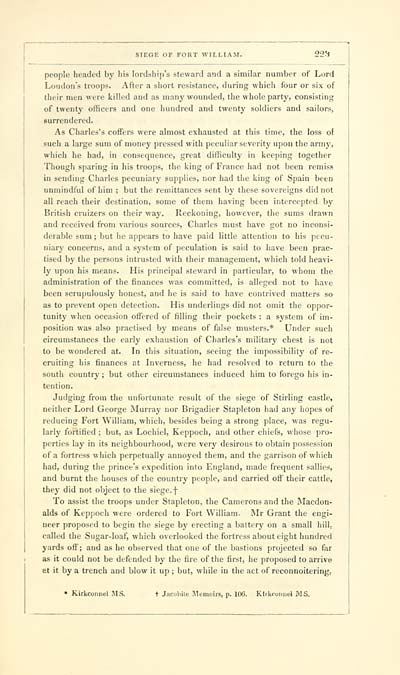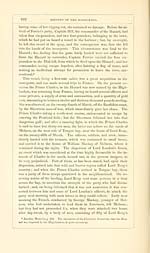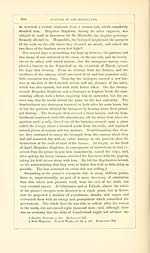Download files
Complete book:
Individual page:
Thumbnail gallery: Grid view | List view

j SIEGE OF FORT WILLIAM. 22f»
people headed by liis lordship's steward and a similar number of Lord
Loudon's troops. After a sliort resistance, during which four or six of
thoir men were killed and as many wounded, the whole party, consisting
of twenty officers and one hundred and twenty soldiers and sailors,
surrendered.
As Charles's coffers were almost exhausted at this time, the loss of
such a large sum of money pressed with peculiar severity upon the army,
which he had, in consequence, great difficulty in keeping together
Though sparing in his troops, the king of Franco had not been remiss
in sending Charles pecuniary supplies, nor had the king of Spain been
unmindful of him ; but the remittances sent by these sovereigns did not
all reach their destination, some of them having been intercepted by
British cruizers on their way. Reckoning, however, the sums drawn
and received from various sources, Charles must have got no inconsi-
derable sum ; but he appears to have paid little attention to his pecu-
niary concerns, and a system of peculaticm is said to have been prac-
tised by the persons intrusted with their management, which told heavi-
ly upon his means. His principal steward in particular, to whom the
administration of the finances was committed, is alleged not to have
been scrupulously honest, and he is said to have contrived matters so
as to prevent open detection. His underlings did not omit the oppor-
tunity when occasion offered of filling their pockets : a system of im-
position was also practised by means of false musters.* Under such
circumstances the early exhaustion of Charles's military chest is not
to be wondered at. In this situation, seeing the impossibility of re-
cruiting his finances at Inverness, he had resolved to return to the
south country ; but other circumstances induced him to forego his in-
tention.
Judging from the unfortunate result of the siege of Stirling castle,
neither Lord George iMurray nor Brigadier Stapleton had any hopes of
reducing Fort William, which, besides being a strong place, was regu-
larly fortified ; but, as Lochiel, Keppoch, and other chiefs, whose pro-
perties lay in its neighbourhood, were verj' desirous to obtain possession
of a fortress which perpetually annoyed them, and the garrison of which
had, during the prince's expedition into England, made frequent sallies,
and burnt the houses of the country people, and carried off their cattle,
they did not object to the siege. f
To assist the troops under Stapleton, the Camerons and the Macdon-
alds of Kep]ioch were ordered to Fort William. Mr Grant the engi-
neer proposed to begin the siege by erecting a battery on a small hill,
called the Sugar-loaf, which overlooked the fortress about eight hundred
yards off; and as he observed that one of the bastions projected so far
as it could not be defended by the fire of the first, he proposed to arrive
et it by a trench and blow it up ; but, while in the act of reconnoitering,
• Kirkcomiel M.S. t J.icohjle Altmoirs, p. 100. Klrkroiuitl MS.
people headed by liis lordship's steward and a similar number of Lord
Loudon's troops. After a sliort resistance, during which four or six of
thoir men were killed and as many wounded, the whole party, consisting
of twenty officers and one hundred and twenty soldiers and sailors,
surrendered.
As Charles's coffers were almost exhausted at this time, the loss of
such a large sum of money pressed with peculiar severity upon the army,
which he had, in consequence, great difficulty in keeping together
Though sparing in his troops, the king of Franco had not been remiss
in sending Charles pecuniary supplies, nor had the king of Spain been
unmindful of him ; but the remittances sent by these sovereigns did not
all reach their destination, some of them having been intercepted by
British cruizers on their way. Reckoning, however, the sums drawn
and received from various sources, Charles must have got no inconsi-
derable sum ; but he appears to have paid little attention to his pecu-
niary concerns, and a system of peculaticm is said to have been prac-
tised by the persons intrusted with their management, which told heavi-
ly upon his means. His principal steward in particular, to whom the
administration of the finances was committed, is alleged not to have
been scrupulously honest, and he is said to have contrived matters so
as to prevent open detection. His underlings did not omit the oppor-
tunity when occasion offered of filling their pockets : a system of im-
position was also practised by means of false musters.* Under such
circumstances the early exhaustion of Charles's military chest is not
to be wondered at. In this situation, seeing the impossibility of re-
cruiting his finances at Inverness, he had resolved to return to the
south country ; but other circumstances induced him to forego his in-
tention.
Judging from the unfortunate result of the siege of Stirling castle,
neither Lord George iMurray nor Brigadier Stapleton had any hopes of
reducing Fort William, which, besides being a strong place, was regu-
larly fortified ; but, as Lochiel, Keppoch, and other chiefs, whose pro-
perties lay in its neighbourhood, were verj' desirous to obtain possession
of a fortress which perpetually annoyed them, and the garrison of which
had, during the prince's expedition into England, made frequent sallies,
and burnt the houses of the country people, and carried off their cattle,
they did not object to the siege. f
To assist the troops under Stapleton, the Camerons and the Macdon-
alds of Kep]ioch were ordered to Fort William. Mr Grant the engi-
neer proposed to begin the siege by erecting a battery on a small hill,
called the Sugar-loaf, which overlooked the fortress about eight hundred
yards off; and as he observed that one of the bastions projected so far
as it could not be defended by the fire of the first, he proposed to arrive
et it by a trench and blow it up ; but, while in the act of reconnoitering,
• Kirkcomiel M.S. t J.icohjle Altmoirs, p. 100. Klrkroiuitl MS.
Set display mode to: Large image | Transcription
Images and transcriptions on this page, including medium image downloads, may be used under the Creative Commons Attribution 4.0 International Licence unless otherwise stated. ![]()
| Early Gaelic Book Collections > Ossian Collection > History of the Highlands and of the Highland clans > Volume 3 > (257) |
|---|
| Permanent URL | https://digital.nls.uk/79655506 |
|---|
| Description | Vol. III. |
|---|---|
| Shelfmark | Oss.249 |
| Attribution and copyright: |
|
| Description | Selected books from the Ossian Collection of 327 volumes, originally assembled by J. Norman Methven of Perth. Different editions and translations of James MacPherson's epic poem 'Ossian', some with a map of the 'Kingdom of Connor'. Also secondary material relating to Ossianic poetry and the Ossian controversy. |
|---|
| Description | Selected items from five 'Special and Named Printed Collections'. Includes books in Gaelic and other Celtic languages, works about the Gaels, their languages, literature, culture and history. |
|---|

